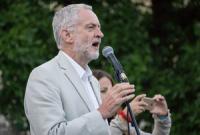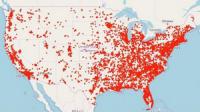-
Ahead of the 2020 election: National response to confront foreign interference
Stanford University scholars outline a detailed strategy for how to protect the integrity of American elections – including recommendations such as requiring a paper trail of every vote cast and publishing information about a campaign’s connections with foreign nationals.
-
-
Scam contractors preying on victims of natural disasters
Following a natural disaster or strong storm like Hurricane Florence, there is usually a second wave of potential destruction – scam artists looking to line their pockets. “After any major weather-related incident, insurance adjusters and contractors swarm the affected area and, unfortunately, some are looking to take advantage of those in distress,” says one expert.
-
-
U.K. equality watchdog launches formal investigation into Labour Party over anti-Semitism claims

The Equality and Human Rights Commission (EHRC) announced Tuesday a full statutory investigation against the British Labour Party over its failure to stamp out anti-Semitism in its ranks and to investigate if the party had “unlawfully discriminated” against people because they are Jewish.
-
-
Assange’s new indictment: Espionage and the First Amendment
The Espionage Act, a sweeping federal statute enacted a century ago, imposes heavy criminal penalties for obtaining or disclosing classified information without proper authorization. Beginning under President Barack Obama, recent years saw a dramatic increase in prosecutions under the Espionage Act. But these prosecutions were directed at leakers of classified information — all government employees and government contractors — not at journalists or publishers. That makes Assange’s indictment a watershed.
-
-
Ghost guns are everywhere in California

Feds say nearly a third of firearms recovered in California are homemade, unserialized, and untraceable. Experts say the accessibility of ghost guns is aided by a cottage industry of retailers selling nearly completed firearms that require no screening to purchase.
-
-
Eric Oliver on the science of conspiracy theories and political polarization
The “birthers,” “Pizzagate,” anti-vaxxers. It seems that belief in conspiracy theories is on the rise. At the same time, our polarization is worse than ever. People can hardly even maintain a conversation across political or cultural lines. Could the underlying force driving conspiracy theories also be the same one that’s dividing our country?
-
-
Russia’s unrelenting attacks on the U.S. justice system
Russia’s broad campaign against liberal democracies shows no signs of abating. Information operations targeted against democratic institutions provide an incredibly high return on investment for the Kremlin. The U.S. justice system is under attack as part of a long-term Russian effort to undermine the appeal of democracy and weaken the West. Using multi-platform disinformation operations, Kremlin-backed operatives work to exacerbate existent divisions within populations and increase overall mistrust of and paranoia about democratic institutions.
-
-
Studying Perry Mason to combat “innocence fatigue”
Forensic science historian Professor Ian Burney is studying the influence of Erle Stanley Gardner, creator of renowned TV attorney Perry Mason, in a bid to reveal the roots of the fascination with stories about wrongful criminal conviction. Burney hopes the study will help better understand some of the challenges facing today’s worldwide “innocence projects.”
-
-
Online voting not ready for prime time
Online voting is often considered a way to improve voter turnout and security. But according to one expert, computer scientists have got a long way to go before they make it a viable alternative to pencils and paper.
-
-
More mass shooting in states with permissive gun laws

States with more permissive gun laws and greater gun ownership have higher rates of mass shootings, and a growing divide is emerging between states with restrictive versus permissive gun laws. According to a new study, researchers found that in most years permissive states had higher mass shooting rates compared to restrictive states.
-
-
Bosnian massacre survivors hail UN court ruling on Karadzic sentence
Relatives of victims of the Srebrenica massacre have hailed a UN court decision that ordered Bosnian Serb wartime leader Radovan Karadzic to serve the rest of his life in prison on genocide and war crimes charges. Karadzic was found guilty for his role in the July 1995 Srebrenica massacre of more than 8,000 Muslim men and boys by Bosnian Serb forces. It was the worst atrocity in Europe since World War II.
-
-
Israeli Supreme Court bars extreme Jewish candidate from running in April election
Israel’s Supreme Court has disqualified the leader of the extremist Otzma Yehudit (Jewish Power) party, Michael Ben-Ari, from running in the upcoming general election in April. Overturning an earlier decision by Israel’s electoral committee, the court banned Ben Ari in an 8-1 vote, citing his anti-Arab ideology and “incitement to racism.”
-
-
Fraudulent news, disinformation become “new normal” political tactics

New report warns of the risk of fraudulent news and online disinformation becoming a normalized part of U.S. political discourse. The report sounds an alarm that fraudulent news and online disinformation, which distort public discourse, erode faith in journalism, and skew voting decisions, are becoming part of the toolbox of hotly contested modern campaigns.
-
-
Information literacy must be improved to stop spread of “fake news”
It is not difficult to verify whether a new piece of information is accurate; however, most people do not take that step before sharing it on social media, regardless of age, social class or gender, a new study has found.
-
-
Legal experts: Emergency declaration may not be quickest way to build wall
Even if President Donald Trump gets his way, eminent domain lawyers say a variety of legal issues would arise surrounding private land seizures that could delay wall construction for years — and even derail it entirely.
-
More headlines
The long view
The True Dangers of Long Trains
Trains are getting longer. Rail companies had recently adopted a moneymaking strategy to move cargo faster than ever, with fewer workers, on trains that are consistently longer than at any time in history. Railroads are getting richer, but these “monster trains” are jumping off of tracks across America and regulators are doing little to curb the risk.
New Report Card to Assess, Rank Campus Responses to Antisemitism
In the face of growing antisemitism across U.S. college campuses, ADL announced that it is developing a new tool to evaluate the climate of antisemitism on individual campuses. The ADL will create comparative evaluation of how leading colleges and universities are responding to the surge of antisemitism and protecting their Jewish students.
Truth Decay and National Security
The line between fact and opinion in public discourse has been eroding, and with it the public’s ability to have arguments and find common ground based in fact. Two core drivers of Truth Decay are political polarization and the spread of misinformation—and these are particularly intertwined in the national security arena. Exposure to misinformation leads to increased polarization, and increased polarization decreases the impact of factual information. Individuals, institutions, and the nation as a whole are vulnerable to this vicious cycle.
